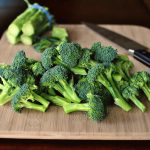A few weeks ago the European Food Conference in Fens took place in Berlin. The Berliner-Zeitung took this event as an opportunity to conduct an interview with the nutritionist and Congress President Heiner Boeing. What the scientist reports here about the current research focus in the field of nutrition arouses curiosity. The experts are currently planning measurement options with which they can analyze the individual effects of various eating habits and determine their own personal nutritional requirements. There is still a long way to go, as Heiner Boeing confirms, but the goal is clear: away from a generalized diet towards an individually adapted diet.

People are not equal
The further nutritional science advances, the clearer it becomes that – contrary to what was long suspected – there is no such thing as the right diet, but actually different ways to a healthy lifestyle. For example: cereals are mentioned in many diets as one of the main components of a balanced diet. Whole grain basically beats heavily processed grain here, such as found in white bread. But whole grains in particular cause problems for many consumers. You suffer from severe abdominal pain after consuming whole grains.
The Paleo diet completely dispenses with cereals and other foods that are only edible after heavy processing. But meat makes up a high proportion of the menu here. Vegans, on the other hand, completely refrain from consuming animal products. Boeing says: “Veganism is a step in the right direction, but it would be welcome if we generally eat less meat.”
With so many contradictions between different forms of nutrition alone, it seems high time for an individualized diet. But what do researchers need to get results?
Better research possibilities thanks to smartphones
Researching nutrition also means investing time. In contrast to the effects of drugs, for example, the effects of diet can often only be seen in a very long-term study. This makes research in this area difficult, because the test persons not only have to be available reliably for a longer period of time, but also have to meticulously record their food intake. What used to require annoying and time-consuming recordings is now made easier thanks to smartphones. Special apps make it possible that the test persons only have to take a picture of their food. The app then analyzes the components and keeps a food diary independently.
A first step: different phases of life are taken into account
Until we actually know the nutritional needs of a person individually can determine, as already indicated, a lot of time will pass. A first step in the right direction is to look at nutrition in different phases of life. In the interview with the Berliner Zeitung, Heiner Boeing takes up the example of the elderly, in whom protein plays an important role in the diet, because a deficiency would accelerate the natural muscle breakdown that takes place in old age.
We can be curious to see what findings await us in the future – and whether one or the other nutritional lie may even be uncovered.




